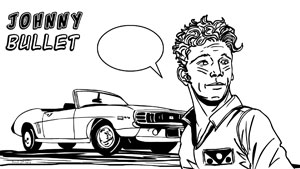|
|
 |
The original 1960s Star Trek was revelatory: a Western in space with progressive casting and themes. Firmly wedded to the values of tolerance, acceptance, and human community, the USS Enterprise launched in 1966 with the mission to boldly go to where race, ethnicity, language, and ideology no longer divided us from each other.
Promising that in the 23rd century, our differences would unite us and make us strong, this famous starship charged off into space, just to see what it would find. Every moment was an encounter with the exotic Other, on the bridge and through the galaxies. These encounters were driven by a genuine wish to form friendships and alliances, perceived as intrinsically good and desirable. The show exploded with heart, as the bonds of friendship grew ever tighter between the show's lead characters. It also exploded with goodness, because of the crew's unwavering commitment to doing the right thing, like being honest, loyal, brave, and compassionate.
All of this was executed through dazzling special effects, riveting characters, humor, romance, and fisticuffs. It was wildly amazing, and canceled rather quickly.
Now J.J. Abrams presents us with an origin story that brings Kirk, Spock, McCoy, Sulu, Chekhov, Scotty, and Uhura together for the first time. Abrams' job was to jumpstart the franchise, and he did it. Star Trek 2009 is funny and edge-of-your-seat exciting. The voices are all authentic. There is no parody here, and no postmodern self-consciousness. It is revelatory, seeing these beloved personages for the first time, so to speak.
But it isn't nearly as visionary as the original show. There's nothing shocking now about seeing a Russian on the bridge of a ship with an American commander. The women, while perhaps brainier than they were in 1966, are still playing the same role they did forty years ago: objects of male desire.
Yes, it's forty years later. How much progress have we made in the direction of Gene Roddenberry's hopeful vision of what we can be?
Telling an origin story and jumpstarting the franchise allowed Abrams to put that question aside and concentrate on getting the characters and the settings right while laying the table for a banquet of good stories to come. We'll give him a free pass this time, for doing such a good job.
But Roddenberry never shied from difficult themes. His Enterprise was the vehicle he used in order to explore them. It's no coincidence that the franchise faltered and ultimately failed after his death.
There will be tough challenges moving forward. Thanks to Abrams' admirable execution, the Star Trek universe as envisioned by Roddenberry is firmly in place, familiar yet strange. The storytelling possibilities are infinite, and can all be explored within a framework as familiar as home. Yet what made Star Trek endure beyond its friendships was its exploration of the human condition.
Star Trek was never about good guys fighting bad guys, even though that happened a whole lot. The plot always served a theme. The show exposed the stupidity and futility of racism with the simplicity of an editorial cartoon. It asked what makes a man strong, explored the limits of technical progress, suggested new facets to sentience, and always prodded us to be humble and to listen in order to learn.
Star Trek 2009 didn't seem to worry too much about its theme. Even while vaguely suggesting that racial extinction might have a deeply damaging psychological impact on the survivors, it was happy enough to remorselessly dispense with the bad guys. For this new James T. Kirk, compassion has mere instrumental value. His older self knew it had intrinsic value. In this sense, this painfully youthful crew is out of step with your father's Star Trek. Let's hope it's an early misstep. We could be on the verge of something really special.
© Copyright 2002-2026 by Toon Doctor Inc. - All rights Reserved. All other texts, images, characters and trademarks are copyright their respective owners. Use of material in this document (including reproduction, modification, distribution, electronic transmission or republication) without prior written permission is strictly prohibited.

